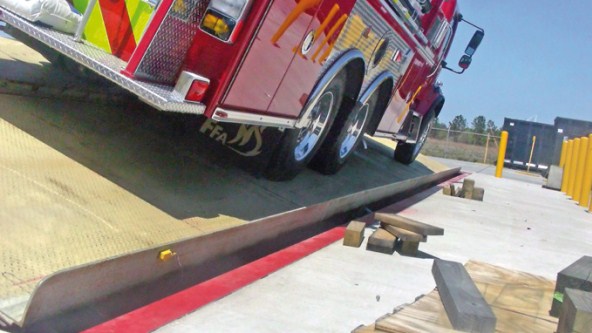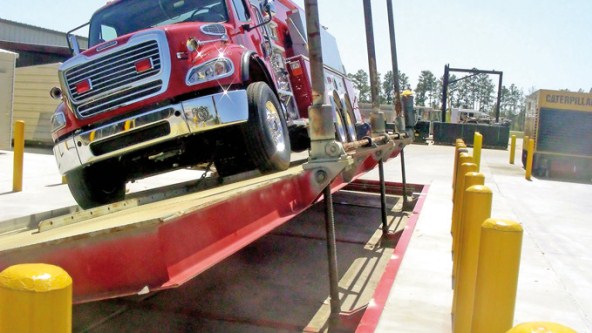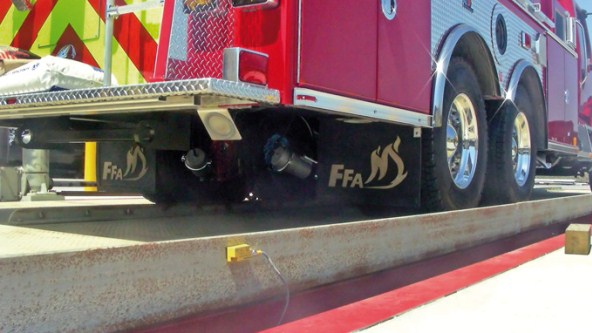Preventing Rollovers
Ferrara Fire Apparatus uses Turck’s inclinometer for tilt testing to make sure that its fire trucks are stable in the field
Firefighters put their lives on the line doing far more than running into burning buildings. Even getting to the emergency scene can be dangerous. That is why the National Fire Protection Association (NFPA) developed standards for new fire apparatus equipment used to transport firefighters. The code, 1901 Standard for Automotive Fire Apparatus, outlines the standards required for manufacturing a fire truck to ensure the firefighters’ safety.
One of these requirements involves vehicle stability to ensure that the fire truck does not roll over during operation. NFPA 1901 4.13.1 outlines the ways in which a fire truck can adhere to this standard: by tilting the truck on a tilt table to 26.5 degrees in both directions or to equip the truck with an electronic stability control (ESC) system. According to A.K. Rosenhan, a consulting engineer specializing in fire apparatus construction, testing, evaluation and failure analysis: “ESC systems are expensive, prone to problems and not available on all chassis. Plus, many drivers do not like their controls being overridden.
Though using a tilt table is a quasi-static test, it is much easier and less dangerous to conduct – and certainly much easier on the fire truck than driving around in a circle of a specified radius at a specified speed to see if you roll over.” Ferrara Fire Apparatus, a leading manufacturer of custom emergency response vehicles located in Holden, Louisiana, has been heavily involved in crash testing and safety analysis, and offers both electronic stability control systems and on-site tilt table testing for their vehicles. “Knowing that stability testing was coming with the new 1901 standard, Ferrara Fire Apparatus made the investment in a test facility at our factory, compliant with SAE 2180,” says Chris Ferrara, President of Ferrara Fire Apparatus.
Tilt Table Testing
An important component of the tilt table is to accurately measure the amount of tilt and to record other test parameters, such as body shift, for documentation and ultimate certification. After using a simple pendulum type angle indicator to gauge the tilt of the table, Ferrara chose to use Turck’s single axis inclinometer because of its reliability and ease of use. “Many driver/operators have a strong preference for tilt table testing, wanting to avoid the throttle limitations associated with ESC,” notes Ferrara.
“As gravity is pretty constant, the results of a tilt-table test are consistent, not prone to error or interpretation, and have rather graphic proof that a fire apparatus is compliant with the NFPA standard,” adds Rosenhan. “Turck’s inclinometer does a fine job of providing such data.” “It’s a dramatic thing to see some 65,000 pounds of fire apparatus, worth up to $1 million, hanging up in the air. Obviously there are chains and straps that loosely anchor the apparatus but do provide for enough movement to determine if the vehicle 'flunks' testing,” concludes Rosenhan.
- OTOMOTİV
- Assembly Management with a Direct MES Connection
- Otomobil Üretiminde Gövde Algılama
- Reliable Skid Detection in Automotive Production
- Error-free JIS Order Picking for Bumpers
- Akü Üretiminde Lazer Sensör İle Metal Parlak Silindirleri Algılama
- RFID Bus Modu Lityum-İyon Pillerin Kalitesini Olmasını Sağlar
- Daldırmalı Kaplama Hattında Seviye Ölçümü
- Merkezi Yağlama Sisteminde Seviye Kontrolü
- Tutkallama Robotunda Kalite Güvencesi
- Eğim Ölçer Platform Hizalanmasını Hızlandırır
- Paralel Durum İzlemeli Motor Kontrolü
- IP67 Hybrid Modül İle Gripper Üzerindeki Emniyet Sinyallerinin Kontrolü
- Soğutma İstasyonlarının RFID İle Dağıtılmış Otomasyon ile İzlenmesi
- Ethernet Altyapısı İle Birbirine Bağlanan Robot Kaynak Hücreleri
- Kaynak Kelepçelerinde Soğutma Devresi İzleme
- Tambur Yıkama Makinelerinde Akış İzleme
- Sheet Metal Thickness Measurement
- İyileştirme Projesi Olarak Motor Durumlarının İzlenmesi
- CNC Tezgahlarında Soğutma Yağlarını Kolayce İzleyin
- Pres Hatlarında Kalıp Tanımlama
- Gövde
- Boyahane
- Montaj
- Motor & Aktarma
- Robotik Hücreler İçin Alan Koruma
- UHF RFID İle Ürün-Seviye Tespiti
- Makinalarda Soğutma Yağının İzlenmesi
- Basınç Tesislerinde Hidrolik Basıncın Kontrol Edilmesi
- Makine Kaldırma Süreçlerinde Ölçme Basıncı
- Otomotivde Kaynak Ucu Tespiti
- Manuel Yük Hücresinde Kaynak
- Son Montaj - Siyah Kapı Paneli Üzerindeki Siyah Parçaların Tespiti
- Son Montaj - Açılır Otomobil Tavanlarında Şeffaf Cam Tespiti
- Son Montaj - Uzun Menzilli Otomotiv Montajında Kontrol
- Güç Aktarma Hatları - Motor Blok Üzerinde Lastik Pul Tespiti
- Güç Aktarma - Motor Blok Pozisyon Kontrolü
- Electric Vehicle Detection in Charging Station
- Vehicle Detection in a Self-Serve Car Wash
- BAŞARI HİKAYELERİ
- Lazer Sensör, Montaj Hücresindeki Siyah Tamponları Algılar
- Modüler Üretim İçin Dağıtılmış Emniyet Teknolojisi
- Modüler Konveyör Sistemi
- Aletlerin Güvenli Değişimi İçin RFID ve I/O Modülleri
- Süspansiyon Üretiminde AGV İle RFID Kullanımı
- IO-Link İle Susturucu Üretimi
- Arka Havalandırma Üretiminde İşparçası Taşıyıcısının Tanımlanması
- Kaynak Somunu Algılama
- RFID ile İzlenebilirlik
- Motor Üretiminde RFID
- RFID Tanımlama ile Tampon Üretimi
- Boya Atölyeleri için Çözümler
- Kaynak ve Montaj Sensörleri
- Montaj Sistemleri için Açı Sensörleri
- Parça Tanıma
- Pick-To-Light Kokpit Üretimini İyileştirir
- Enjektör Nozullarının RFID ile Tanımlanması
- Araç Gövdesi Üretiminde RFID
- IO-Link Diferansiyel Dişlisi Üretimini Kolaylaştırıyor
- KİMYA
- Decentralized Automation in Ex Areas
- RFID Control of Tube Connections in the Ex Area
- I&C Odasında Yer Tasarrufu Ethernet Sinyal Bağlantısı
- Tehlikeli Bölgedeki Modüler Kızakların Ethernet Tabanlı Otomasyonu
- Modüler Proses Tesislerinde Ex İzolasyon
- Demirlerin Tespiti
- Uzak I/O Sinyalleri
- Saha Cihazlarının Kolay Bağlantısı,
- Kontrol Kabin Sistemlerinde I/O ile Sinyal İşleme
- Kontrol Kabininde Arayüz Teknolojisi ile Sinyal Ayırma
- Hortum Bağlantılarının Tanımlanması
- Sahadaki Panoların Verimli İzlenmesi
- Çeyrek Turlu Aktüatörlerin İzlenmesi
- Sistem Çözümlerinin Planlanması ve Montajı
- BAŞARI HİKAYELERİ
- EXCOM I/O Sistemi Kontrol Odalarınızda Yer Açıyor!
- Zone 2 ve Zone 22'de RFID
- Verimli Test Kontrolü
- Excom İle Güvenli Sistemler
- Proses Kontrol Sistem İşbirliği
- Riskli Bölge için Uzak I/O
- Çift Klapeli Vanalarda Konum Bilgisi Alma
- Fieldbus ile Esneklik
- Uzak I/O ile Varlık Yönetimi
- Karbür Üretiminde RFID İle Doğru Konumlandırma
- Kompakt Ex Koruma
- ENERJİ
- Gıda ve İçecek
- Durum İzleme Sensörü Otomatik Klima Kontrolü
- Kontrol Kabinlerinin Durum İzlenmesi
- Depo Odalarında Durum İzleme
- Rulo Makinalarında Hamur Kalınlığı Kontrolü
- Gıda Konteynerlerinin Tanımlanması
- Kapların Kontrolü
- Terminal Bağlantısı ile Sensörlerin Hızlı Değişimi
- Boru Dirseklerinin Tespiti
- Çikolata Kalıplarının Tanımlanması
- BAŞARI HİKAYELERİ
- RFID Support Enables Track and Trace in Food Production
- Atex Zone 22'de Güvenilir Doğrusal Konum Tespiti
- Decentralized Control Modules in Coldstore
- Track and Trace in Meat Production with RFID
- Patates Üretiminde Temassız Enkoder
- Gıda Dağıtım Merkezinde UHF RFID
- Çikolata Üretimi için RFID
- Gıda Ekipmanları İçin Dağıtılmış I/O
- İçki Fabrikaları için Uzak I/O Çözümleri
- RFID ve Otoklavlar
- Çikolata Üretiminde Şeffaflık
- Konveyörler için IP67 Güç Kaynakları
- Gıda Ürünleri Deposunda Tanımlama
- Kamera İle Şişe Algılama
- Detecting Refrigerated Breakfast Rolls on a Multi-Lane Conveyor
- Logistics
- Tracking Big Bags with RFID
- Distance Detection in Container Cranes
- Korunan Alanlar İçin Geçiş Kontrolü
- Elektro-duyarlı Koruyucu Ekipmanın Dağıtılmış Otomasyonu
- I/O Blocks Control Roller Conveyor Modules
- Konteyner Kontrolü
- Depo Kapılarında Hızlı Etiket Algılama
- Item-level Detection with UHF RFID
- Konveyör Bantlarda Kestirimci Bakım
- Detection of Transport Containers
- Level Detection in Vessels
- Kriyojenik Konteynırların Tanımlanması
- Identification of Mobile Containers with Handheld Devices
- Gıda Kaplarının Tanımlanması
- Tier 1 – Planlı Tampon Tanımlaması
- Condition Monitoring in Storage Rooms
- İstifleme Araçlarında Çarpışma Önleme
- BAŞARI HİKAYELERİ
- RFID Enables Unmanned Store at Major Building Site
- I/O and Safety Modules Increase Throughput in Intralogistics
- Shipment Tracking for Raw Materials
- RFID-Based Tracking Solution for Loading Error Minimization
- RFID-based Tracking of Inbound and Outbound Materials
- Dağıtılmış Otomasyon İle UHF RFID Çözümü
- Contact-free Encoder in Potato Production
- Decentralized Control Modules in Coldstore
- Radar Sensörü QT50 İle Hız Kontrolü
- Konveyörler İçin IP67 Güç Kaynakları
- Modüler Konveyör Sistemi
- Depo İçin RFID Çözümü
- Süspansiyon Üretiminde AGV İle RFID Kullanımı
- RFID İlaçları Tanımlar
- UHF RFID in Food Distribution Center
- Autonomous Parking Assistance for Trucks
- MOBİL UYGULAMALAR
- Durum İzleme Sensörü Otomatik Klima Kontrolü
- Automatic Slope Compensation
- Distribution Lines for Field Sprayers
- Tarla Pulverizatöründe Açı Ölçümü
- Biçerdöverlerde Malzeme Akışı İzleme
- Determining the Boom Angle Position
- Yangın Motorlarında Ekipman Bölüm Aydınlatması
- Biçerdöverlerde İki Eksenli Eğim Ölçümü
- İstifleme Uygulamalarında Çarpışma Önleme
- BAŞARI HİKAYELERİ
- RFID Solution with Smart Forklifts in Autombile Production
- Safe Remote Maintenance of Irrigation and Drainage Pumps
- RFID Sistemi İle Erişim Kontrolü
- Otonom Robot İle Hasat Seçimi
- RFID ve Enkoder ile Pozisyon Ölçümü
- Speed Control via Radar Sensor QT50
- RFID Guides AGV in Suspension Production
- Süper Yat Üzerindeki Blok I/O Modülleri
- Tarak Gemilerinde Temassız Enkoder
- Toz Tutmak için I/O
- Kabin Soğutma
- Hızlı Bağlantı Kesme
- Aşırı Soğuk için Otomasyon Çözümleri
- Vinçler için Uzak I/O
- Sağlam Ağır Metal Kaldırma
- Rollercoaster Konumlandırma
- Gelecek İçin Üretim
- Hatasız Yükseklik Ölçümü
- Kritik Açı Tespiti
- Açı Sensörü Platform Kaldırmasını Algılar
- Petrol ve Gaz
- Paketleme
- Dağıtılmış Otomasyon İle Paket Doğrulama
- Identification of Printing Color Cartridges
- Makinelerin Güvenilir Çalışması
- Container Check
- Dolum Hatlarında Kapakların İzlenmesi
- Değişim Süreçlerinin İzlenmesi
- Test Şişelerinin Tanımlanması
- Granül Kahve Seviye İzleme
- Kaplarda Seviye Tespiti
- Taşıma Konteynerlerinin Tespiti
- BAŞARI HİKAYELERİ
- İlaç
- RFID İle Uçtan Uca Numune Takibi
- Patlayıcı Alanlarda Tüp Bağlantılarının RFID Kontrolü
- Dağıtılmış RFID Paketi Doğrulaması
- Modüler Skidlerin Ethernet Tabanlı Otomasyonu
- Dağıtılmış I/O Teknolojisine Sahip İlaç Skidleri
- Ex Alanlarda Dağıtılmış Otomasyon
- Vana Arayüzlerinin Merkezi Kontrolü
- Çeyrek Dönüş Aktüatörlerinin İzlenmesi
- Detection of Pipe Elbows
- Uzak I/O Sinyalleri
- Bağlantı Kutuları İle Skidlerin Planlaması
- Saha Cihazlarının Kolay Bağlantısı
- Cryovessellerin Tanımlanması
- Mobil Konteynerlerin Tanımlanması
- El Terminali İle Mobil Konteynerlerin Tanımlanması
- Hortum Bağlantılarının Tanımlanması
- Identification of Hose Connections in Sterile Areas
- Identification of Hose Connections in Ex Zone 1
- Identification of Big Bags and Bioreactors
- Tek Kullanımlık Ürünlerin Uygulamlarında Tanımlama
- BAŞARI HİKAYELERİ
- Yarıiletken
- Parça Tanımlayıcıların Yüksek Hassasiyette Tespiti
- Counting Integrated Circuits
- Bir Parça Üzerinde İki Barkod Kontrolü
- Kompakt Güvenlik Kontrolü
- Safeguarding Small Access Points
- Adhesive Detection on PCB Assembly
- Great Detail Inspection for Mobile Electronic Devices
- Banta Yüklenen Devre Çipleri İçin Hata Tespiti
- Presence and Orientation of IC Chips Seated in Nests
- Hard Disk Algılama
- Işıklı Ürün Montaj İstasyonu
- Yarı İletken İmalatı Sırasında LED Durum Gösterimi
- Küçük Erişim Noktalarını Daha Güvenli Yapmak
- BAŞARI HİKAYELERİ
Select Country
Turck worldwide







